Diabetes Care: Multidisciplinary Team Roles, Barriers, & Solutions
VerifiedAdded on 2022/10/09
|11
|3000
|181
Essay
AI Summary
This essay examines the critical roles of a multidisciplinary healthcare team in diabetes care, emphasizing a patient-centered approach. It details the responsibilities of endocrinologists, podiatrists, dietitians, optometrists, exercise physiologists, general practitioners, registered nurses, and pharmacists in managing diabetes. The essay highlights the importance of self-care skills and addresses the barriers to effective diabetes management, such as patient stress, societal misconceptions, and financial constraints. It also proposes recommendations for improving patient care through a well-coordinated healthcare system. The paper underscores the significance of a comprehensive approach to diabetes treatment, integrating medical expertise, patient education, and support to enhance the quality of life and mitigate complications associated with the disease.

Diabetes care 1
Diabetes Care
Student Name
University
Supervisor
Diabetes Care
Student Name
University
Supervisor
Paraphrase This Document
Need a fresh take? Get an instant paraphrase of this document with our AI Paraphraser
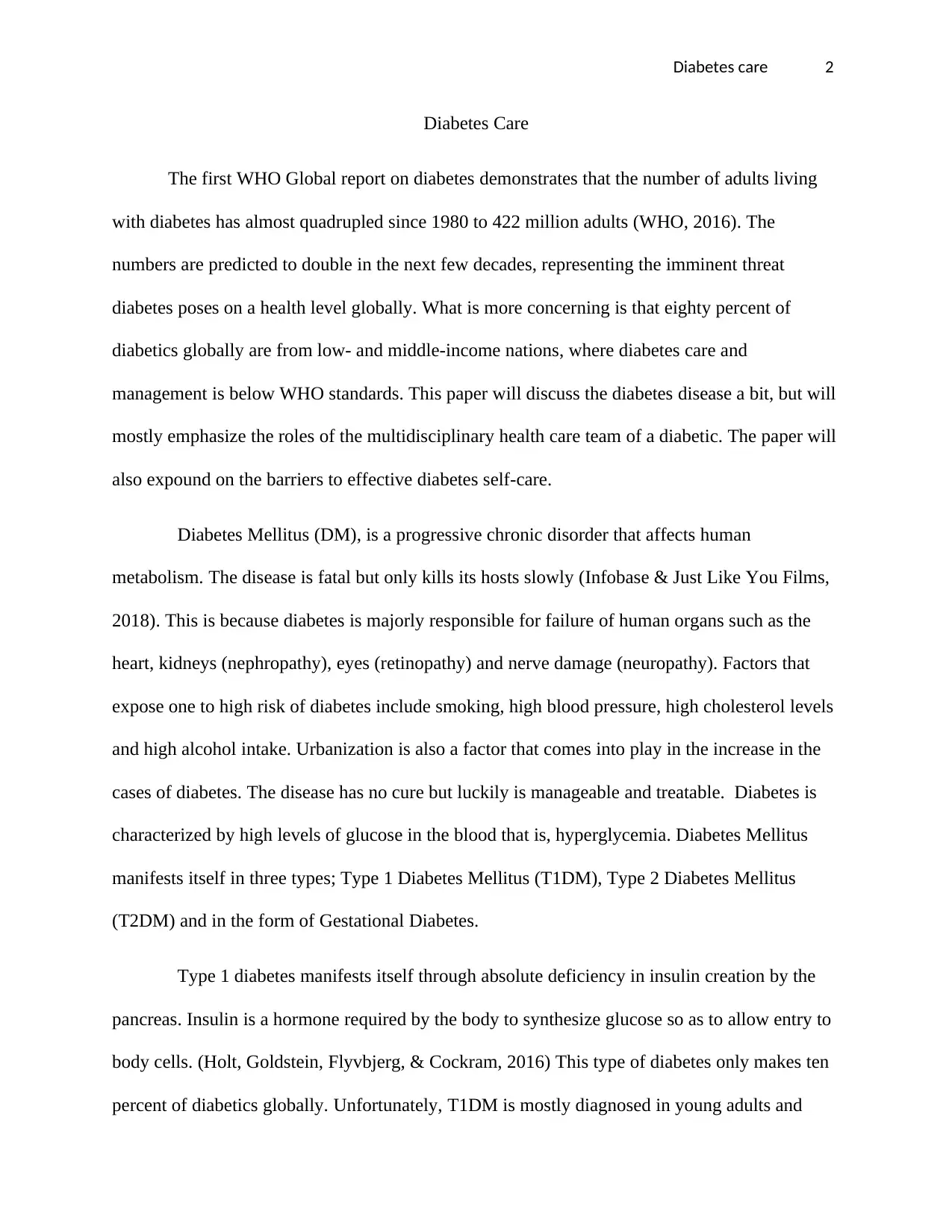
Diabetes care 2
Diabetes Care
The first WHO Global report on diabetes demonstrates that the number of adults living
with diabetes has almost quadrupled since 1980 to 422 million adults (WHO, 2016). The
numbers are predicted to double in the next few decades, representing the imminent threat
diabetes poses on a health level globally. What is more concerning is that eighty percent of
diabetics globally are from low- and middle-income nations, where diabetes care and
management is below WHO standards. This paper will discuss the diabetes disease a bit, but will
mostly emphasize the roles of the multidisciplinary health care team of a diabetic. The paper will
also expound on the barriers to effective diabetes self-care.
Diabetes Mellitus (DM), is a progressive chronic disorder that affects human
metabolism. The disease is fatal but only kills its hosts slowly (Infobase & Just Like You Films,
2018). This is because diabetes is majorly responsible for failure of human organs such as the
heart, kidneys (nephropathy), eyes (retinopathy) and nerve damage (neuropathy). Factors that
expose one to high risk of diabetes include smoking, high blood pressure, high cholesterol levels
and high alcohol intake. Urbanization is also a factor that comes into play in the increase in the
cases of diabetes. The disease has no cure but luckily is manageable and treatable. Diabetes is
characterized by high levels of glucose in the blood that is, hyperglycemia. Diabetes Mellitus
manifests itself in three types; Type 1 Diabetes Mellitus (T1DM), Type 2 Diabetes Mellitus
(T2DM) and in the form of Gestational Diabetes.
Type 1 diabetes manifests itself through absolute deficiency in insulin creation by the
pancreas. Insulin is a hormone required by the body to synthesize glucose so as to allow entry to
body cells. (Holt, Goldstein, Flyvbjerg, & Cockram, 2016) This type of diabetes only makes ten
percent of diabetics globally. Unfortunately, T1DM is mostly diagnosed in young adults and
Diabetes Care
The first WHO Global report on diabetes demonstrates that the number of adults living
with diabetes has almost quadrupled since 1980 to 422 million adults (WHO, 2016). The
numbers are predicted to double in the next few decades, representing the imminent threat
diabetes poses on a health level globally. What is more concerning is that eighty percent of
diabetics globally are from low- and middle-income nations, where diabetes care and
management is below WHO standards. This paper will discuss the diabetes disease a bit, but will
mostly emphasize the roles of the multidisciplinary health care team of a diabetic. The paper will
also expound on the barriers to effective diabetes self-care.
Diabetes Mellitus (DM), is a progressive chronic disorder that affects human
metabolism. The disease is fatal but only kills its hosts slowly (Infobase & Just Like You Films,
2018). This is because diabetes is majorly responsible for failure of human organs such as the
heart, kidneys (nephropathy), eyes (retinopathy) and nerve damage (neuropathy). Factors that
expose one to high risk of diabetes include smoking, high blood pressure, high cholesterol levels
and high alcohol intake. Urbanization is also a factor that comes into play in the increase in the
cases of diabetes. The disease has no cure but luckily is manageable and treatable. Diabetes is
characterized by high levels of glucose in the blood that is, hyperglycemia. Diabetes Mellitus
manifests itself in three types; Type 1 Diabetes Mellitus (T1DM), Type 2 Diabetes Mellitus
(T2DM) and in the form of Gestational Diabetes.
Type 1 diabetes manifests itself through absolute deficiency in insulin creation by the
pancreas. Insulin is a hormone required by the body to synthesize glucose so as to allow entry to
body cells. (Holt, Goldstein, Flyvbjerg, & Cockram, 2016) This type of diabetes only makes ten
percent of diabetics globally. Unfortunately, T1DM is mostly diagnosed in young adults and
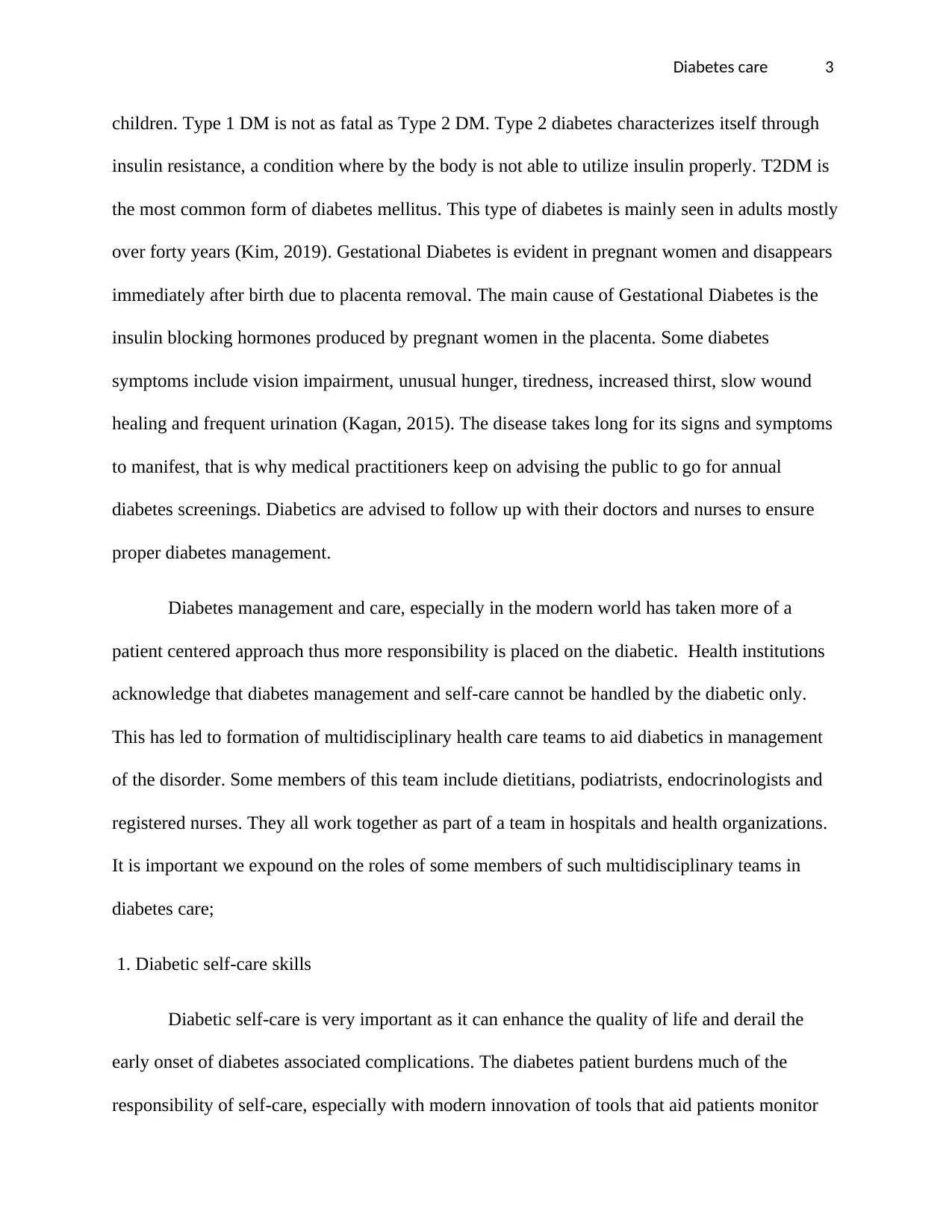
Diabetes care 3
children. Type 1 DM is not as fatal as Type 2 DM. Type 2 diabetes characterizes itself through
insulin resistance, a condition where by the body is not able to utilize insulin properly. T2DM is
the most common form of diabetes mellitus. This type of diabetes is mainly seen in adults mostly
over forty years (Kim, 2019). Gestational Diabetes is evident in pregnant women and disappears
immediately after birth due to placenta removal. The main cause of Gestational Diabetes is the
insulin blocking hormones produced by pregnant women in the placenta. Some diabetes
symptoms include vision impairment, unusual hunger, tiredness, increased thirst, slow wound
healing and frequent urination (Kagan, 2015). The disease takes long for its signs and symptoms
to manifest, that is why medical practitioners keep on advising the public to go for annual
diabetes screenings. Diabetics are advised to follow up with their doctors and nurses to ensure
proper diabetes management.
Diabetes management and care, especially in the modern world has taken more of a
patient centered approach thus more responsibility is placed on the diabetic. Health institutions
acknowledge that diabetes management and self-care cannot be handled by the diabetic only.
This has led to formation of multidisciplinary health care teams to aid diabetics in management
of the disorder. Some members of this team include dietitians, podiatrists, endocrinologists and
registered nurses. They all work together as part of a team in hospitals and health organizations.
It is important we expound on the roles of some members of such multidisciplinary teams in
diabetes care;
1. Diabetic self-care skills
Diabetic self-care is very important as it can enhance the quality of life and derail the
early onset of diabetes associated complications. The diabetes patient burdens much of the
responsibility of self-care, especially with modern innovation of tools that aid patients monitor
children. Type 1 DM is not as fatal as Type 2 DM. Type 2 diabetes characterizes itself through
insulin resistance, a condition where by the body is not able to utilize insulin properly. T2DM is
the most common form of diabetes mellitus. This type of diabetes is mainly seen in adults mostly
over forty years (Kim, 2019). Gestational Diabetes is evident in pregnant women and disappears
immediately after birth due to placenta removal. The main cause of Gestational Diabetes is the
insulin blocking hormones produced by pregnant women in the placenta. Some diabetes
symptoms include vision impairment, unusual hunger, tiredness, increased thirst, slow wound
healing and frequent urination (Kagan, 2015). The disease takes long for its signs and symptoms
to manifest, that is why medical practitioners keep on advising the public to go for annual
diabetes screenings. Diabetics are advised to follow up with their doctors and nurses to ensure
proper diabetes management.
Diabetes management and care, especially in the modern world has taken more of a
patient centered approach thus more responsibility is placed on the diabetic. Health institutions
acknowledge that diabetes management and self-care cannot be handled by the diabetic only.
This has led to formation of multidisciplinary health care teams to aid diabetics in management
of the disorder. Some members of this team include dietitians, podiatrists, endocrinologists and
registered nurses. They all work together as part of a team in hospitals and health organizations.
It is important we expound on the roles of some members of such multidisciplinary teams in
diabetes care;
1. Diabetic self-care skills
Diabetic self-care is very important as it can enhance the quality of life and derail the
early onset of diabetes associated complications. The diabetes patient burdens much of the
responsibility of self-care, especially with modern innovation of tools that aid patients monitor
⊘ This is a preview!⊘
Do you want full access?
Subscribe today to unlock all pages.

Trusted by 1+ million students worldwide
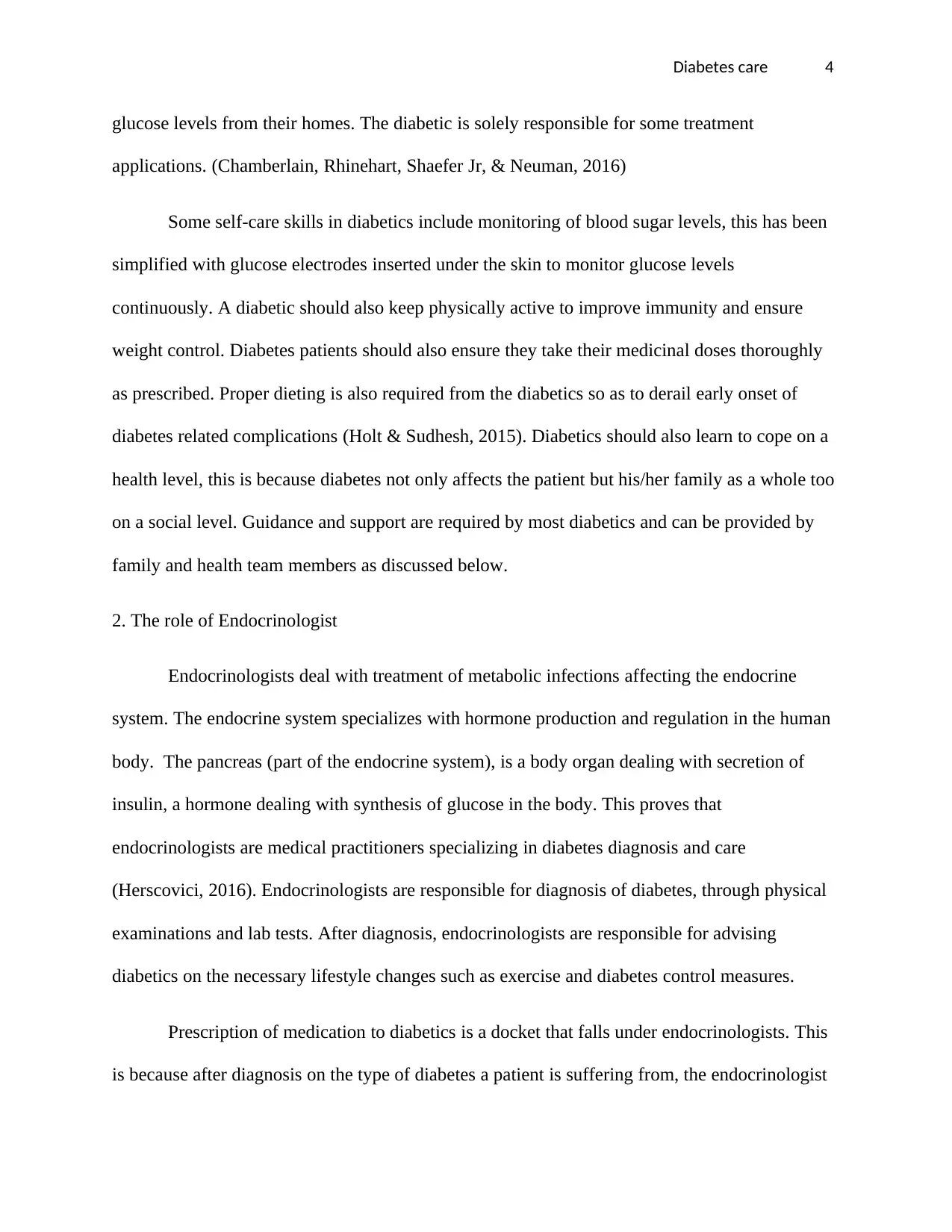
Diabetes care 4
glucose levels from their homes. The diabetic is solely responsible for some treatment
applications. (Chamberlain, Rhinehart, Shaefer Jr, & Neuman, 2016)
Some self-care skills in diabetics include monitoring of blood sugar levels, this has been
simplified with glucose electrodes inserted under the skin to monitor glucose levels
continuously. A diabetic should also keep physically active to improve immunity and ensure
weight control. Diabetes patients should also ensure they take their medicinal doses thoroughly
as prescribed. Proper dieting is also required from the diabetics so as to derail early onset of
diabetes related complications (Holt & Sudhesh, 2015). Diabetics should also learn to cope on a
health level, this is because diabetes not only affects the patient but his/her family as a whole too
on a social level. Guidance and support are required by most diabetics and can be provided by
family and health team members as discussed below.
2. The role of Endocrinologist
Endocrinologists deal with treatment of metabolic infections affecting the endocrine
system. The endocrine system specializes with hormone production and regulation in the human
body. The pancreas (part of the endocrine system), is a body organ dealing with secretion of
insulin, a hormone dealing with synthesis of glucose in the body. This proves that
endocrinologists are medical practitioners specializing in diabetes diagnosis and care
(Herscovici, 2016). Endocrinologists are responsible for diagnosis of diabetes, through physical
examinations and lab tests. After diagnosis, endocrinologists are responsible for advising
diabetics on the necessary lifestyle changes such as exercise and diabetes control measures.
Prescription of medication to diabetics is a docket that falls under endocrinologists. This
is because after diagnosis on the type of diabetes a patient is suffering from, the endocrinologist
glucose levels from their homes. The diabetic is solely responsible for some treatment
applications. (Chamberlain, Rhinehart, Shaefer Jr, & Neuman, 2016)
Some self-care skills in diabetics include monitoring of blood sugar levels, this has been
simplified with glucose electrodes inserted under the skin to monitor glucose levels
continuously. A diabetic should also keep physically active to improve immunity and ensure
weight control. Diabetes patients should also ensure they take their medicinal doses thoroughly
as prescribed. Proper dieting is also required from the diabetics so as to derail early onset of
diabetes related complications (Holt & Sudhesh, 2015). Diabetics should also learn to cope on a
health level, this is because diabetes not only affects the patient but his/her family as a whole too
on a social level. Guidance and support are required by most diabetics and can be provided by
family and health team members as discussed below.
2. The role of Endocrinologist
Endocrinologists deal with treatment of metabolic infections affecting the endocrine
system. The endocrine system specializes with hormone production and regulation in the human
body. The pancreas (part of the endocrine system), is a body organ dealing with secretion of
insulin, a hormone dealing with synthesis of glucose in the body. This proves that
endocrinologists are medical practitioners specializing in diabetes diagnosis and care
(Herscovici, 2016). Endocrinologists are responsible for diagnosis of diabetes, through physical
examinations and lab tests. After diagnosis, endocrinologists are responsible for advising
diabetics on the necessary lifestyle changes such as exercise and diabetes control measures.
Prescription of medication to diabetics is a docket that falls under endocrinologists. This
is because after diagnosis on the type of diabetes a patient is suffering from, the endocrinologist
Paraphrase This Document
Need a fresh take? Get an instant paraphrase of this document with our AI Paraphraser
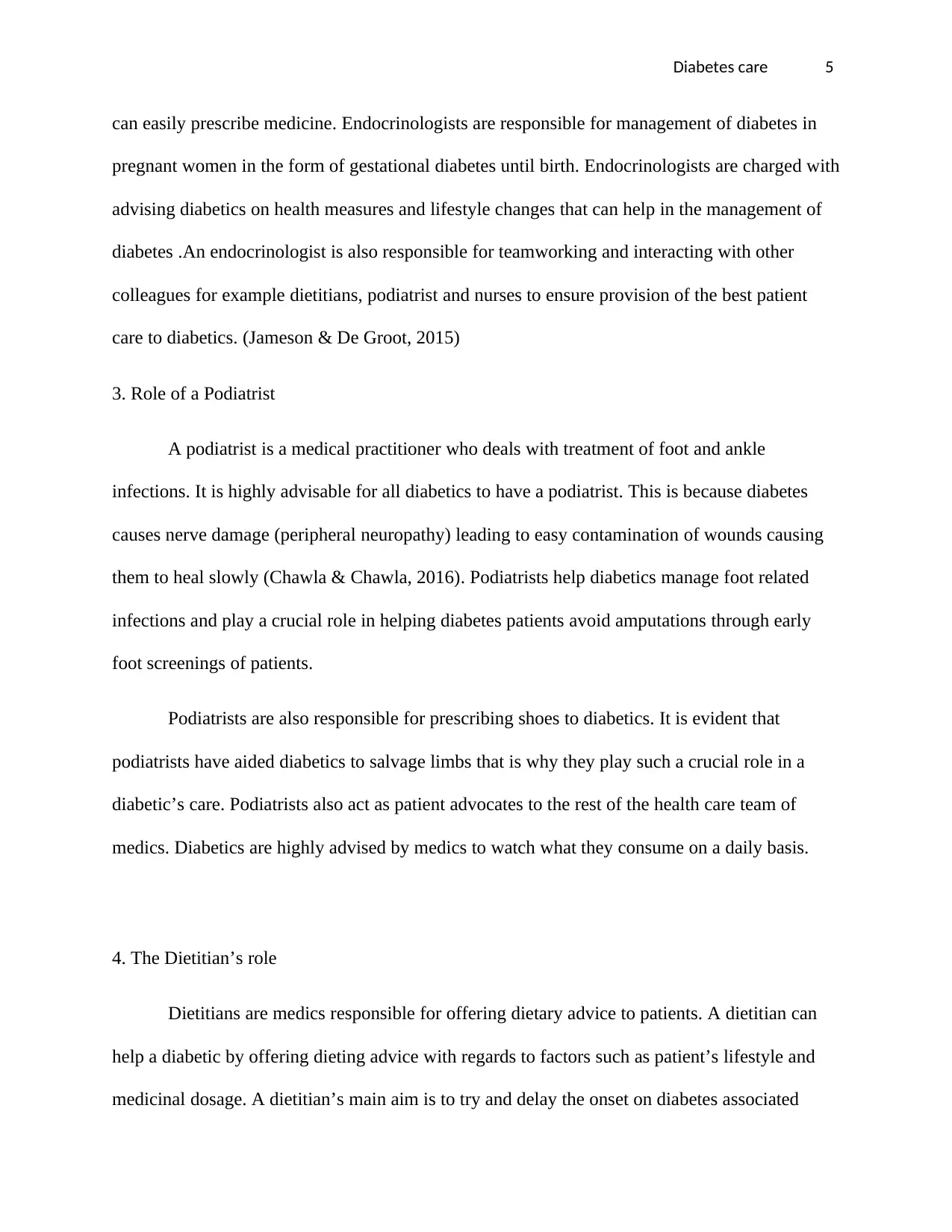
Diabetes care 5
can easily prescribe medicine. Endocrinologists are responsible for management of diabetes in
pregnant women in the form of gestational diabetes until birth. Endocrinologists are charged with
advising diabetics on health measures and lifestyle changes that can help in the management of
diabetes .An endocrinologist is also responsible for teamworking and interacting with other
colleagues for example dietitians, podiatrist and nurses to ensure provision of the best patient
care to diabetics. (Jameson & De Groot, 2015)
3. Role of a Podiatrist
A podiatrist is a medical practitioner who deals with treatment of foot and ankle
infections. It is highly advisable for all diabetics to have a podiatrist. This is because diabetes
causes nerve damage (peripheral neuropathy) leading to easy contamination of wounds causing
them to heal slowly (Chawla & Chawla, 2016). Podiatrists help diabetics manage foot related
infections and play a crucial role in helping diabetes patients avoid amputations through early
foot screenings of patients.
Podiatrists are also responsible for prescribing shoes to diabetics. It is evident that
podiatrists have aided diabetics to salvage limbs that is why they play such a crucial role in a
diabetic’s care. Podiatrists also act as patient advocates to the rest of the health care team of
medics. Diabetics are highly advised by medics to watch what they consume on a daily basis.
4. The Dietitian’s role
Dietitians are medics responsible for offering dietary advice to patients. A dietitian can
help a diabetic by offering dieting advice with regards to factors such as patient’s lifestyle and
medicinal dosage. A dietitian’s main aim is to try and delay the onset on diabetes associated
can easily prescribe medicine. Endocrinologists are responsible for management of diabetes in
pregnant women in the form of gestational diabetes until birth. Endocrinologists are charged with
advising diabetics on health measures and lifestyle changes that can help in the management of
diabetes .An endocrinologist is also responsible for teamworking and interacting with other
colleagues for example dietitians, podiatrist and nurses to ensure provision of the best patient
care to diabetics. (Jameson & De Groot, 2015)
3. Role of a Podiatrist
A podiatrist is a medical practitioner who deals with treatment of foot and ankle
infections. It is highly advisable for all diabetics to have a podiatrist. This is because diabetes
causes nerve damage (peripheral neuropathy) leading to easy contamination of wounds causing
them to heal slowly (Chawla & Chawla, 2016). Podiatrists help diabetics manage foot related
infections and play a crucial role in helping diabetes patients avoid amputations through early
foot screenings of patients.
Podiatrists are also responsible for prescribing shoes to diabetics. It is evident that
podiatrists have aided diabetics to salvage limbs that is why they play such a crucial role in a
diabetic’s care. Podiatrists also act as patient advocates to the rest of the health care team of
medics. Diabetics are highly advised by medics to watch what they consume on a daily basis.
4. The Dietitian’s role
Dietitians are medics responsible for offering dietary advice to patients. A dietitian can
help a diabetic by offering dieting advice with regards to factors such as patient’s lifestyle and
medicinal dosage. A dietitian’s main aim is to try and delay the onset on diabetes associated
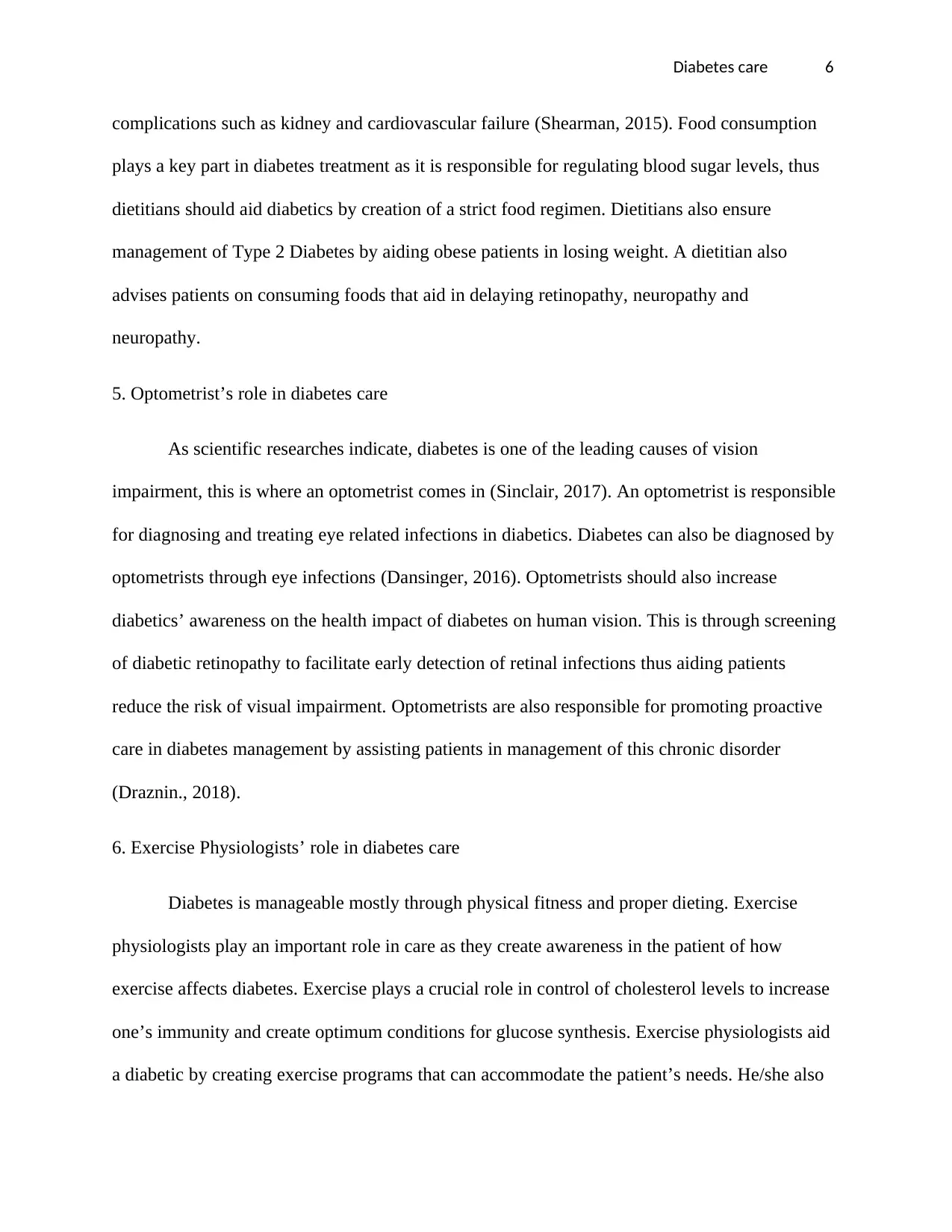
Diabetes care 6
complications such as kidney and cardiovascular failure (Shearman, 2015). Food consumption
plays a key part in diabetes treatment as it is responsible for regulating blood sugar levels, thus
dietitians should aid diabetics by creation of a strict food regimen. Dietitians also ensure
management of Type 2 Diabetes by aiding obese patients in losing weight. A dietitian also
advises patients on consuming foods that aid in delaying retinopathy, neuropathy and
neuropathy.
5. Optometrist’s role in diabetes care
As scientific researches indicate, diabetes is one of the leading causes of vision
impairment, this is where an optometrist comes in (Sinclair, 2017). An optometrist is responsible
for diagnosing and treating eye related infections in diabetics. Diabetes can also be diagnosed by
optometrists through eye infections (Dansinger, 2016). Optometrists should also increase
diabetics’ awareness on the health impact of diabetes on human vision. This is through screening
of diabetic retinopathy to facilitate early detection of retinal infections thus aiding patients
reduce the risk of visual impairment. Optometrists are also responsible for promoting proactive
care in diabetes management by assisting patients in management of this chronic disorder
(Draznin., 2018).
6. Exercise Physiologists’ role in diabetes care
Diabetes is manageable mostly through physical fitness and proper dieting. Exercise
physiologists play an important role in care as they create awareness in the patient of how
exercise affects diabetes. Exercise plays a crucial role in control of cholesterol levels to increase
one’s immunity and create optimum conditions for glucose synthesis. Exercise physiologists aid
a diabetic by creating exercise programs that can accommodate the patient’s needs. He/she also
complications such as kidney and cardiovascular failure (Shearman, 2015). Food consumption
plays a key part in diabetes treatment as it is responsible for regulating blood sugar levels, thus
dietitians should aid diabetics by creation of a strict food regimen. Dietitians also ensure
management of Type 2 Diabetes by aiding obese patients in losing weight. A dietitian also
advises patients on consuming foods that aid in delaying retinopathy, neuropathy and
neuropathy.
5. Optometrist’s role in diabetes care
As scientific researches indicate, diabetes is one of the leading causes of vision
impairment, this is where an optometrist comes in (Sinclair, 2017). An optometrist is responsible
for diagnosing and treating eye related infections in diabetics. Diabetes can also be diagnosed by
optometrists through eye infections (Dansinger, 2016). Optometrists should also increase
diabetics’ awareness on the health impact of diabetes on human vision. This is through screening
of diabetic retinopathy to facilitate early detection of retinal infections thus aiding patients
reduce the risk of visual impairment. Optometrists are also responsible for promoting proactive
care in diabetes management by assisting patients in management of this chronic disorder
(Draznin., 2018).
6. Exercise Physiologists’ role in diabetes care
Diabetes is manageable mostly through physical fitness and proper dieting. Exercise
physiologists play an important role in care as they create awareness in the patient of how
exercise affects diabetes. Exercise plays a crucial role in control of cholesterol levels to increase
one’s immunity and create optimum conditions for glucose synthesis. Exercise physiologists aid
a diabetic by creating exercise programs that can accommodate the patient’s needs. He/she also
⊘ This is a preview!⊘
Do you want full access?
Subscribe today to unlock all pages.

Trusted by 1+ million students worldwide
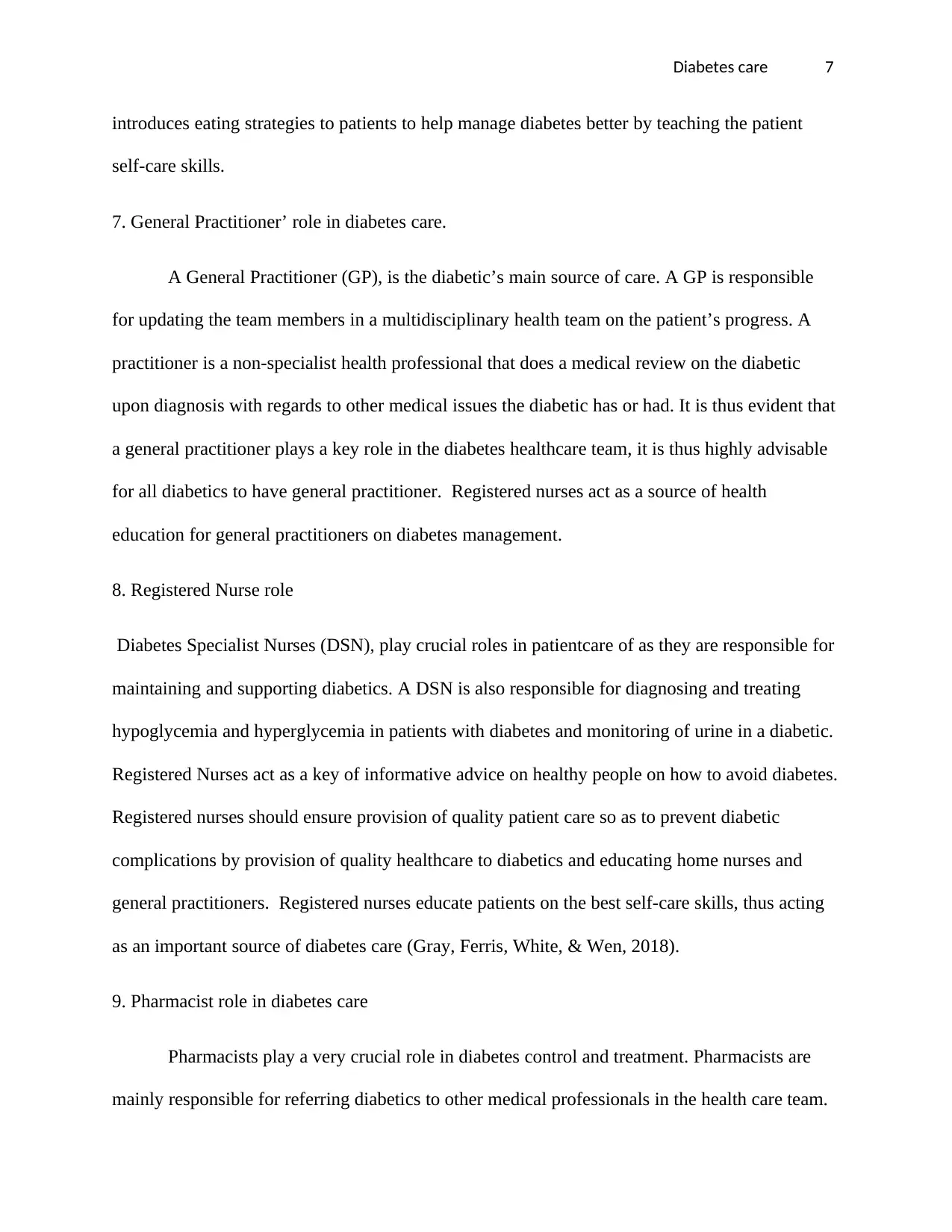
Diabetes care 7
introduces eating strategies to patients to help manage diabetes better by teaching the patient
self-care skills.
7. General Practitioner’ role in diabetes care.
A General Practitioner (GP), is the diabetic’s main source of care. A GP is responsible
for updating the team members in a multidisciplinary health team on the patient’s progress. A
practitioner is a non-specialist health professional that does a medical review on the diabetic
upon diagnosis with regards to other medical issues the diabetic has or had. It is thus evident that
a general practitioner plays a key role in the diabetes healthcare team, it is thus highly advisable
for all diabetics to have general practitioner. Registered nurses act as a source of health
education for general practitioners on diabetes management.
8. Registered Nurse role
Diabetes Specialist Nurses (DSN), play crucial roles in patientcare of as they are responsible for
maintaining and supporting diabetics. A DSN is also responsible for diagnosing and treating
hypoglycemia and hyperglycemia in patients with diabetes and monitoring of urine in a diabetic.
Registered Nurses act as a key of informative advice on healthy people on how to avoid diabetes.
Registered nurses should ensure provision of quality patient care so as to prevent diabetic
complications by provision of quality healthcare to diabetics and educating home nurses and
general practitioners. Registered nurses educate patients on the best self-care skills, thus acting
as an important source of diabetes care (Gray, Ferris, White, & Wen, 2018).
9. Pharmacist role in diabetes care
Pharmacists play a very crucial role in diabetes control and treatment. Pharmacists are
mainly responsible for referring diabetics to other medical professionals in the health care team.
introduces eating strategies to patients to help manage diabetes better by teaching the patient
self-care skills.
7. General Practitioner’ role in diabetes care.
A General Practitioner (GP), is the diabetic’s main source of care. A GP is responsible
for updating the team members in a multidisciplinary health team on the patient’s progress. A
practitioner is a non-specialist health professional that does a medical review on the diabetic
upon diagnosis with regards to other medical issues the diabetic has or had. It is thus evident that
a general practitioner plays a key role in the diabetes healthcare team, it is thus highly advisable
for all diabetics to have general practitioner. Registered nurses act as a source of health
education for general practitioners on diabetes management.
8. Registered Nurse role
Diabetes Specialist Nurses (DSN), play crucial roles in patientcare of as they are responsible for
maintaining and supporting diabetics. A DSN is also responsible for diagnosing and treating
hypoglycemia and hyperglycemia in patients with diabetes and monitoring of urine in a diabetic.
Registered Nurses act as a key of informative advice on healthy people on how to avoid diabetes.
Registered nurses should ensure provision of quality patient care so as to prevent diabetic
complications by provision of quality healthcare to diabetics and educating home nurses and
general practitioners. Registered nurses educate patients on the best self-care skills, thus acting
as an important source of diabetes care (Gray, Ferris, White, & Wen, 2018).
9. Pharmacist role in diabetes care
Pharmacists play a very crucial role in diabetes control and treatment. Pharmacists are
mainly responsible for referring diabetics to other medical professionals in the health care team.
Paraphrase This Document
Need a fresh take? Get an instant paraphrase of this document with our AI Paraphraser
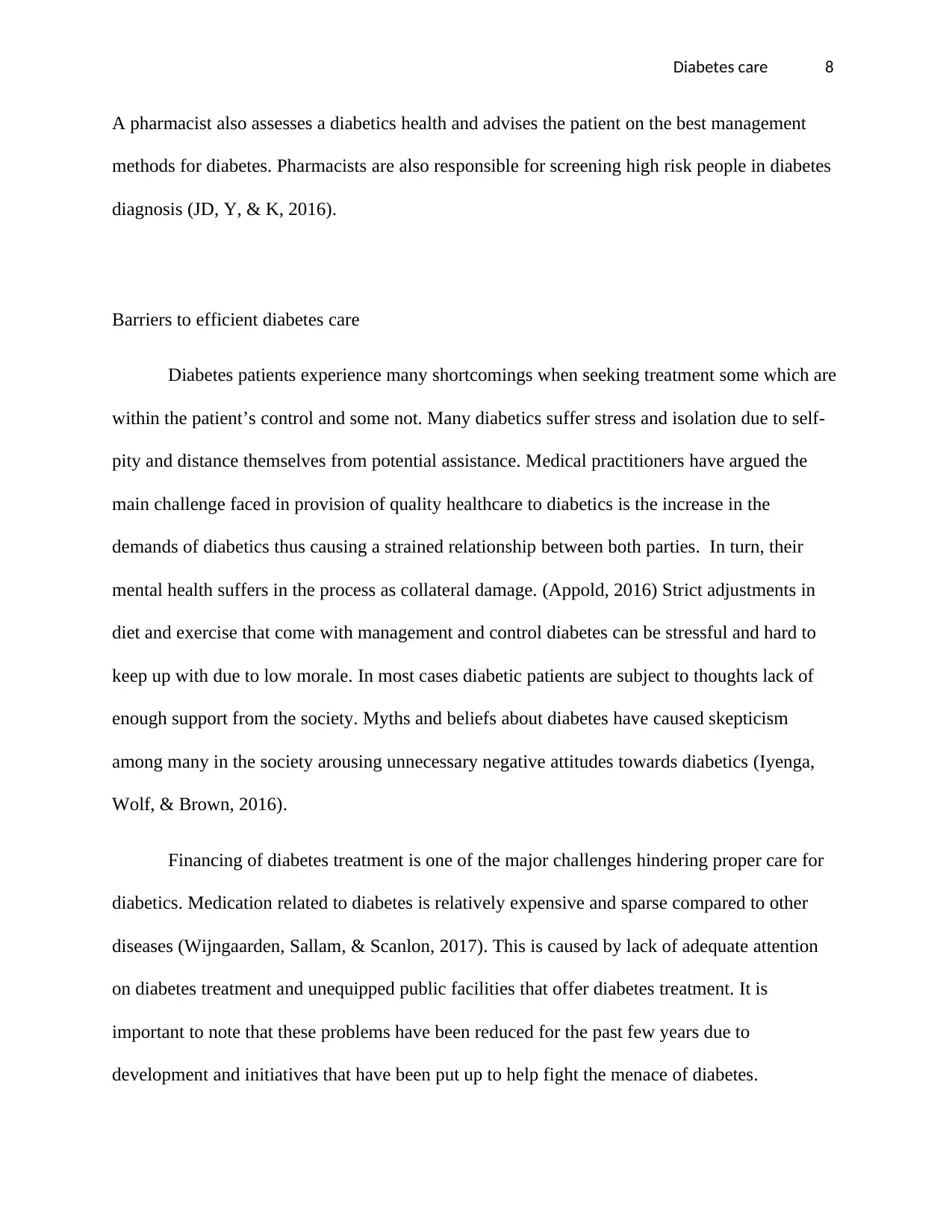
Diabetes care 8
A pharmacist also assesses a diabetics health and advises the patient on the best management
methods for diabetes. Pharmacists are also responsible for screening high risk people in diabetes
diagnosis (JD, Y, & K, 2016).
Barriers to efficient diabetes care
Diabetes patients experience many shortcomings when seeking treatment some which are
within the patient’s control and some not. Many diabetics suffer stress and isolation due to self-
pity and distance themselves from potential assistance. Medical practitioners have argued the
main challenge faced in provision of quality healthcare to diabetics is the increase in the
demands of diabetics thus causing a strained relationship between both parties. In turn, their
mental health suffers in the process as collateral damage. (Appold, 2016) Strict adjustments in
diet and exercise that come with management and control diabetes can be stressful and hard to
keep up with due to low morale. In most cases diabetic patients are subject to thoughts lack of
enough support from the society. Myths and beliefs about diabetes have caused skepticism
among many in the society arousing unnecessary negative attitudes towards diabetics (Iyenga,
Wolf, & Brown, 2016).
Financing of diabetes treatment is one of the major challenges hindering proper care for
diabetics. Medication related to diabetes is relatively expensive and sparse compared to other
diseases (Wijngaarden, Sallam, & Scanlon, 2017). This is caused by lack of adequate attention
on diabetes treatment and unequipped public facilities that offer diabetes treatment. It is
important to note that these problems have been reduced for the past few years due to
development and initiatives that have been put up to help fight the menace of diabetes.
A pharmacist also assesses a diabetics health and advises the patient on the best management
methods for diabetes. Pharmacists are also responsible for screening high risk people in diabetes
diagnosis (JD, Y, & K, 2016).
Barriers to efficient diabetes care
Diabetes patients experience many shortcomings when seeking treatment some which are
within the patient’s control and some not. Many diabetics suffer stress and isolation due to self-
pity and distance themselves from potential assistance. Medical practitioners have argued the
main challenge faced in provision of quality healthcare to diabetics is the increase in the
demands of diabetics thus causing a strained relationship between both parties. In turn, their
mental health suffers in the process as collateral damage. (Appold, 2016) Strict adjustments in
diet and exercise that come with management and control diabetes can be stressful and hard to
keep up with due to low morale. In most cases diabetic patients are subject to thoughts lack of
enough support from the society. Myths and beliefs about diabetes have caused skepticism
among many in the society arousing unnecessary negative attitudes towards diabetics (Iyenga,
Wolf, & Brown, 2016).
Financing of diabetes treatment is one of the major challenges hindering proper care for
diabetics. Medication related to diabetes is relatively expensive and sparse compared to other
diseases (Wijngaarden, Sallam, & Scanlon, 2017). This is caused by lack of adequate attention
on diabetes treatment and unequipped public facilities that offer diabetes treatment. It is
important to note that these problems have been reduced for the past few years due to
development and initiatives that have been put up to help fight the menace of diabetes.
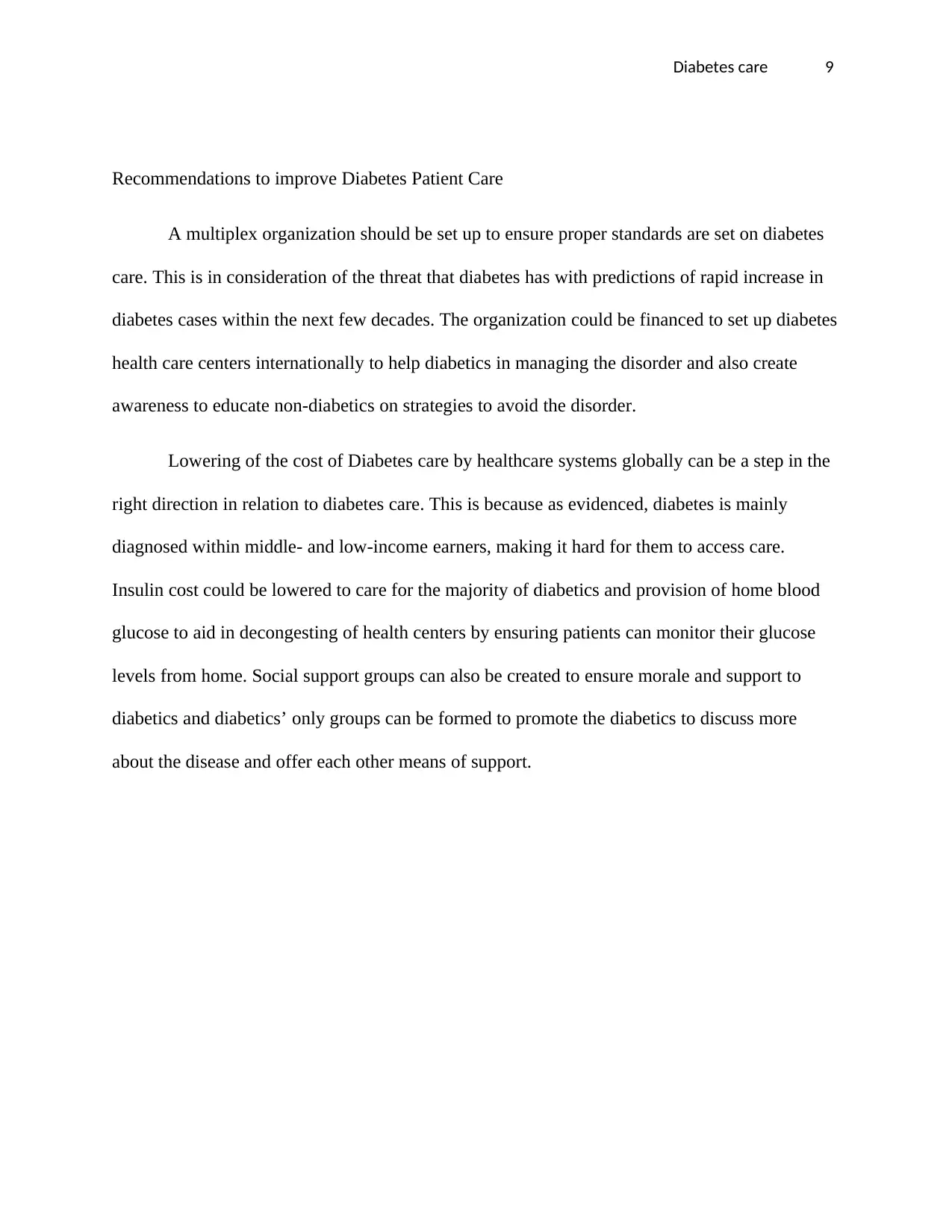
Diabetes care 9
Recommendations to improve Diabetes Patient Care
A multiplex organization should be set up to ensure proper standards are set on diabetes
care. This is in consideration of the threat that diabetes has with predictions of rapid increase in
diabetes cases within the next few decades. The organization could be financed to set up diabetes
health care centers internationally to help diabetics in managing the disorder and also create
awareness to educate non-diabetics on strategies to avoid the disorder.
Lowering of the cost of Diabetes care by healthcare systems globally can be a step in the
right direction in relation to diabetes care. This is because as evidenced, diabetes is mainly
diagnosed within middle- and low-income earners, making it hard for them to access care.
Insulin cost could be lowered to care for the majority of diabetics and provision of home blood
glucose to aid in decongesting of health centers by ensuring patients can monitor their glucose
levels from home. Social support groups can also be created to ensure morale and support to
diabetics and diabetics’ only groups can be formed to promote the diabetics to discuss more
about the disease and offer each other means of support.
Recommendations to improve Diabetes Patient Care
A multiplex organization should be set up to ensure proper standards are set on diabetes
care. This is in consideration of the threat that diabetes has with predictions of rapid increase in
diabetes cases within the next few decades. The organization could be financed to set up diabetes
health care centers internationally to help diabetics in managing the disorder and also create
awareness to educate non-diabetics on strategies to avoid the disorder.
Lowering of the cost of Diabetes care by healthcare systems globally can be a step in the
right direction in relation to diabetes care. This is because as evidenced, diabetes is mainly
diagnosed within middle- and low-income earners, making it hard for them to access care.
Insulin cost could be lowered to care for the majority of diabetics and provision of home blood
glucose to aid in decongesting of health centers by ensuring patients can monitor their glucose
levels from home. Social support groups can also be created to ensure morale and support to
diabetics and diabetics’ only groups can be formed to promote the diabetics to discuss more
about the disease and offer each other means of support.
⊘ This is a preview!⊘
Do you want full access?
Subscribe today to unlock all pages.

Trusted by 1+ million students worldwide
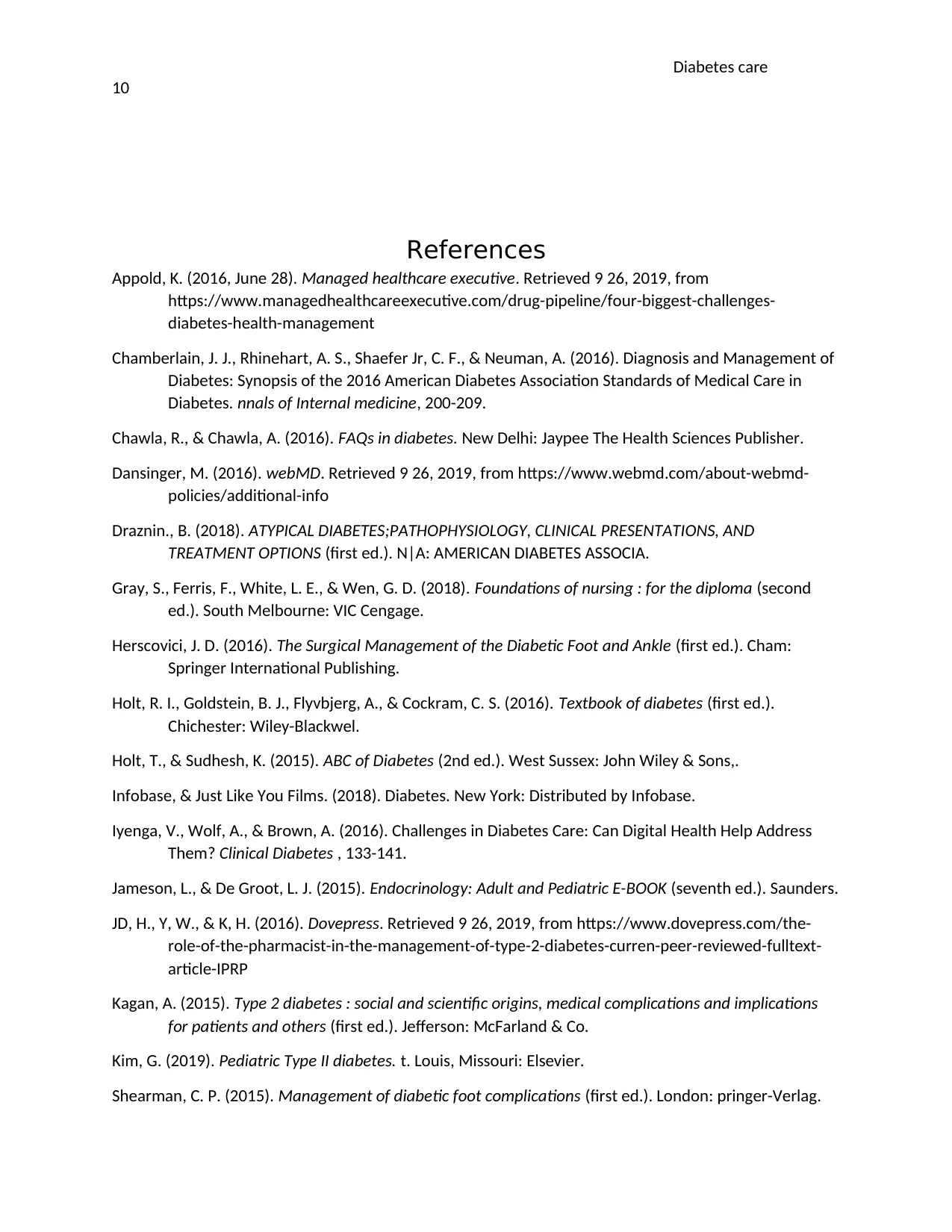
Diabetes care
10
References
Appold, K. (2016, June 28). Managed healthcare executive. Retrieved 9 26, 2019, from
https://www.managedhealthcareexecutive.com/drug-pipeline/four-biggest-challenges-
diabetes-health-management
Chamberlain, J. J., Rhinehart, A. S., Shaefer Jr, C. F., & Neuman, A. (2016). Diagnosis and Management of
Diabetes: Synopsis of the 2016 American Diabetes Association Standards of Medical Care in
Diabetes. nnals of Internal medicine, 200-209.
Chawla, R., & Chawla, A. (2016). FAQs in diabetes. New Delhi: Jaypee The Health Sciences Publisher.
Dansinger, M. (2016). webMD. Retrieved 9 26, 2019, from https://www.webmd.com/about-webmd-
policies/additional-info
Draznin., B. (2018). ATYPICAL DIABETES;PATHOPHYSIOLOGY, CLINICAL PRESENTATIONS, AND
TREATMENT OPTIONS (first ed.). N|A: AMERICAN DIABETES ASSOCIA.
Gray, S., Ferris, F., White, L. E., & Wen, G. D. (2018). Foundations of nursing : for the diploma (second
ed.). South Melbourne: VIC Cengage.
Herscovici, J. D. (2016). The Surgical Management of the Diabetic Foot and Ankle (first ed.). Cham:
Springer International Publishing.
Holt, R. I., Goldstein, B. J., Flyvbjerg, A., & Cockram, C. S. (2016). Textbook of diabetes (first ed.).
Chichester: Wiley-Blackwel.
Holt, T., & Sudhesh, K. (2015). ABC of Diabetes (2nd ed.). West Sussex: John Wiley & Sons,.
Infobase, & Just Like You Films. (2018). Diabetes. New York: Distributed by Infobase.
Iyenga, V., Wolf, A., & Brown, A. (2016). Challenges in Diabetes Care: Can Digital Health Help Address
Them? Clinical Diabetes , 133-141.
Jameson, L., & De Groot, L. J. (2015). Endocrinology: Adult and Pediatric E-BOOK (seventh ed.). Saunders.
JD, H., Y, W., & K, H. (2016). Dovepress. Retrieved 9 26, 2019, from https://www.dovepress.com/the-
role-of-the-pharmacist-in-the-management-of-type-2-diabetes-curren-peer-reviewed-fulltext-
article-IPRP
Kagan, A. (2015). Type 2 diabetes : social and scientific origins, medical complications and implications
for patients and others (first ed.). Jefferson: McFarland & Co.
Kim, G. (2019). Pediatric Type II diabetes. t. Louis, Missouri: Elsevier.
Shearman, C. P. (2015). Management of diabetic foot complications (first ed.). London: pringer-Verlag.
10
References
Appold, K. (2016, June 28). Managed healthcare executive. Retrieved 9 26, 2019, from
https://www.managedhealthcareexecutive.com/drug-pipeline/four-biggest-challenges-
diabetes-health-management
Chamberlain, J. J., Rhinehart, A. S., Shaefer Jr, C. F., & Neuman, A. (2016). Diagnosis and Management of
Diabetes: Synopsis of the 2016 American Diabetes Association Standards of Medical Care in
Diabetes. nnals of Internal medicine, 200-209.
Chawla, R., & Chawla, A. (2016). FAQs in diabetes. New Delhi: Jaypee The Health Sciences Publisher.
Dansinger, M. (2016). webMD. Retrieved 9 26, 2019, from https://www.webmd.com/about-webmd-
policies/additional-info
Draznin., B. (2018). ATYPICAL DIABETES;PATHOPHYSIOLOGY, CLINICAL PRESENTATIONS, AND
TREATMENT OPTIONS (first ed.). N|A: AMERICAN DIABETES ASSOCIA.
Gray, S., Ferris, F., White, L. E., & Wen, G. D. (2018). Foundations of nursing : for the diploma (second
ed.). South Melbourne: VIC Cengage.
Herscovici, J. D. (2016). The Surgical Management of the Diabetic Foot and Ankle (first ed.). Cham:
Springer International Publishing.
Holt, R. I., Goldstein, B. J., Flyvbjerg, A., & Cockram, C. S. (2016). Textbook of diabetes (first ed.).
Chichester: Wiley-Blackwel.
Holt, T., & Sudhesh, K. (2015). ABC of Diabetes (2nd ed.). West Sussex: John Wiley & Sons,.
Infobase, & Just Like You Films. (2018). Diabetes. New York: Distributed by Infobase.
Iyenga, V., Wolf, A., & Brown, A. (2016). Challenges in Diabetes Care: Can Digital Health Help Address
Them? Clinical Diabetes , 133-141.
Jameson, L., & De Groot, L. J. (2015). Endocrinology: Adult and Pediatric E-BOOK (seventh ed.). Saunders.
JD, H., Y, W., & K, H. (2016). Dovepress. Retrieved 9 26, 2019, from https://www.dovepress.com/the-
role-of-the-pharmacist-in-the-management-of-type-2-diabetes-curren-peer-reviewed-fulltext-
article-IPRP
Kagan, A. (2015). Type 2 diabetes : social and scientific origins, medical complications and implications
for patients and others (first ed.). Jefferson: McFarland & Co.
Kim, G. (2019). Pediatric Type II diabetes. t. Louis, Missouri: Elsevier.
Shearman, C. P. (2015). Management of diabetic foot complications (first ed.). London: pringer-Verlag.
Paraphrase This Document
Need a fresh take? Get an instant paraphrase of this document with our AI Paraphraser

Diabetes care
11
Sinclair, A. J. (2017). Diabetes in old age (fourth ed.). New Jersey: John wiley & Sons.
WHO. (2016). Global Report on Diabetes. Geneva: World Health Organization.
Wijngaarden, P. v., Sallam, A., & Scanlon, P. H. (2017). A practical manual of diabetic retinopathy
management (second ed.). Chichester: A practical manual of diabetic retinopathy management.
11
Sinclair, A. J. (2017). Diabetes in old age (fourth ed.). New Jersey: John wiley & Sons.
WHO. (2016). Global Report on Diabetes. Geneva: World Health Organization.
Wijngaarden, P. v., Sallam, A., & Scanlon, P. H. (2017). A practical manual of diabetic retinopathy
management (second ed.). Chichester: A practical manual of diabetic retinopathy management.
1 out of 11
Related Documents
Your All-in-One AI-Powered Toolkit for Academic Success.
+13062052269
info@desklib.com
Available 24*7 on WhatsApp / Email
![[object Object]](/_next/static/media/star-bottom.7253800d.svg)
Unlock your academic potential
Copyright © 2020–2026 A2Z Services. All Rights Reserved. Developed and managed by ZUCOL.





